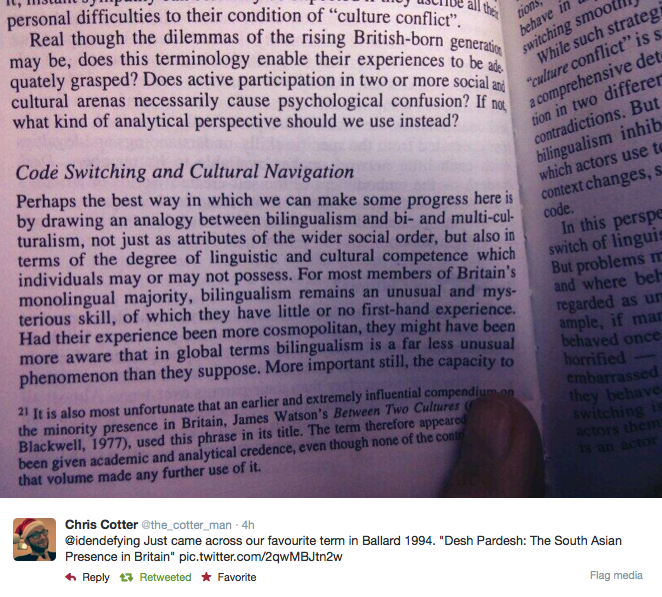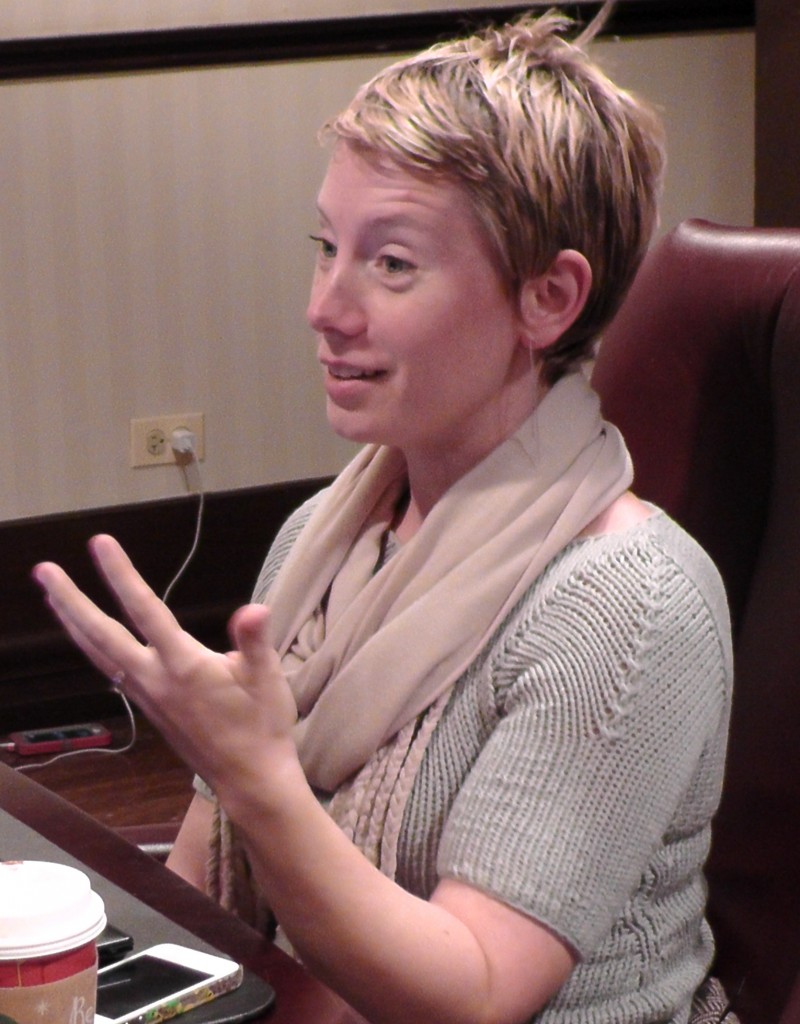 There’s an interesting, understated commercial playing here these days, advertizing a smartphone by not saying anything about it. Continue reading “Beyond Words”
There’s an interesting, understated commercial playing here these days, advertizing a smartphone by not saying anything about it. Continue reading “Beyond Words”
“What We’re Trying to Say Is…”
 Just saw this video making the rounds on social media — seems pretty relevant for what we’re addressing here at Culture on the Edge: looks may be deceiving, yes, but also that identity is a public, collaborative affair.
Just saw this video making the rounds on social media — seems pretty relevant for what we’re addressing here at Culture on the Edge: looks may be deceiving, yes, but also that identity is a public, collaborative affair.
What’s a Language?
 The Edge’s Twitter account was the lucky recipient of this picture earlier this morning (though it wasn’t morning where it originated, was it; thanks @the_cotter-man) — making implicit reference to the recent workshop on “code switching” that four members of the Edge participated in at Lehigh University. Continue reading “What’s a Language?”
The Edge’s Twitter account was the lucky recipient of this picture earlier this morning (though it wasn’t morning where it originated, was it; thanks @the_cotter-man) — making implicit reference to the recent workshop on “code switching” that four members of the Edge participated in at Lehigh University. Continue reading “What’s a Language?”
The Center’s Edge
 Did you catch this interview, earlier today, with Francesca Marciano, about her new collection of stories, The Other Language? It seems to be all about code switching — at least if we understand code switching as found all across culture.
Did you catch this interview, earlier today, with Francesca Marciano, about her new collection of stories, The Other Language? It seems to be all about code switching — at least if we understand code switching as found all across culture.
Give it a listen… Continue reading “The Center’s Edge”
Behind the Scenes: A Conversation on “Code Switching”

Back in late June 2013, three members of Culture on the Edge had a conversation on Facebook about the category “code switching” (nicely exemplified in the above Key & Peele skit, featuring Luther, President Obama’s “anger translator” [watch it below]), a conversation that later led to two blog posts on our site, referencing this conversation (here and here) and, ultimately, to Monica Miller conceiving of a workshop at Lehigh University, funded by a Collaborative Research Grant from its The Humanities Center — an opportunity that will involve Lehigh faculty members, James Peterson, Associate Professor of English and Director of Africana Studies, Jackie Krasas, Associate Professor of Anthropology and Sociology and Director of Women, Gender and Sexuality Studies, along with three of her Edge colleagues: Merinda Simmons, Leslie Dorrough Smith, and Vaia Touna — all of whom work on identity and language, but in very different domains and historical periods.
We hope that the following conversation — spruced up a bit for public consumption — helps to set the stage for some of the early thinking that may be in the background of the workshop, which takes place in April 2014 (more news on that coming soon).
6/29, 4:45pm
Russell McCutcheon
Ok, I have a query: it strikes me that, despite how many use it, “code switching” is a profoundly imperial category, one that perpetuates certain notions of race (when it is applied to studying some instances of African American English), while seemingly only describing them, yet no one realizes it.
What do you think? Continue reading “Behind the Scenes: A Conversation on “Code Switching””
Subtle Screams
 When my oldest child was still a toddler (and in that phase where she was old enough to say “no,” but still young enough to be completely irrational), I called my wise mother one night having a tantrum of my own. I wanted her to tell me how to reason with my daughter – what to tell my precious offspring that would make her eat her breakfast, separate from a beloved toy, or submit to a nap. In short, I was asking for the holy grail of toddler parenting. Continue reading “Subtle Screams”
When my oldest child was still a toddler (and in that phase where she was old enough to say “no,” but still young enough to be completely irrational), I called my wise mother one night having a tantrum of my own. I wanted her to tell me how to reason with my daughter – what to tell my precious offspring that would make her eat her breakfast, separate from a beloved toy, or submit to a nap. In short, I was asking for the holy grail of toddler parenting. Continue reading “Subtle Screams”
“No, Really, Where Are You From?”
 “Race” is such a problematic, complex term, no? We use it as if it refers to some stable thing (like when we complete a government form) but as soon as we look at its use more closely we realize it is a vague designation for a variety that spans a limitless continuum with no clear internal boundaries. “Race” — as in “What race are you?” — is thus our way of creating the impression of managing what may in fact be unbridled human difference, as if it has nicely defined internal compartments.
“Race” is such a problematic, complex term, no? We use it as if it refers to some stable thing (like when we complete a government form) but as soon as we look at its use more closely we realize it is a vague designation for a variety that spans a limitless continuum with no clear internal boundaries. “Race” — as in “What race are you?” — is thus our way of creating the impression of managing what may in fact be unbridled human difference, as if it has nicely defined internal compartments.
Case in point: the fellow above — Alex Sugiura — was featured in a story recently (and another a little before that), on the increasingly mixed race nature of American culture. He’s from Brooklyn but, of course, that’s not where he’s really from, right? Continue reading ““No, Really, Where Are You From?””
“Hoi Polloi”
 As a native Greek speaker, the words in English that give me most trouble—especially when I find myself at various conferences or lectures in North America that involve, in some way or another, the use of Ancient Greek—is the pronunciation of those words. I admit that I can’t resist the temptation of correction for example whenever I hear Thucydides (pronounced: Thu-si-di-dees) instead of Θουκυδίδης (pronounced: Thu-ky-theē-thees). But once I found myself in an awkward position where context made the text if not unrecognizable but certainly irrelevant. Continue reading ““Hoi Polloi””
As a native Greek speaker, the words in English that give me most trouble—especially when I find myself at various conferences or lectures in North America that involve, in some way or another, the use of Ancient Greek—is the pronunciation of those words. I admit that I can’t resist the temptation of correction for example whenever I hear Thucydides (pronounced: Thu-si-di-dees) instead of Θουκυδίδης (pronounced: Thu-ky-theē-thees). But once I found myself in an awkward position where context made the text if not unrecognizable but certainly irrelevant. Continue reading ““Hoi Polloi””
On the Spot with Leslie Dorrough Smith
“On the Spot” backs members of Culture on the Edge into a corner to talk about their backgrounds, their ongoing work, and what might be gained by an alternative understanding of how identity works.
 Q: Leslie, you have a book out soon that is on the way a certain rhetoric of chaos vs. order is used by some groups in the U.S. to organize themselves, by distinguishing their members from others, their preferences from others, and their values from others. Is that a fair (if general) description of your project? Could you tell us more?
Q: Leslie, you have a book out soon that is on the way a certain rhetoric of chaos vs. order is used by some groups in the U.S. to organize themselves, by distinguishing their members from others, their preferences from others, and their values from others. Is that a fair (if general) description of your project? Could you tell us more?
A: Yes – this is a fairly unorthodox approach to a very mainstream subject. The book, which is about the rhetoric of one Christian Right group, is entitled Righteous Rhetoric: Sex, Speech, and the Politics of Concerned Women for America (Oxford, 2014). Continue reading “On the Spot with Leslie Dorrough Smith”
